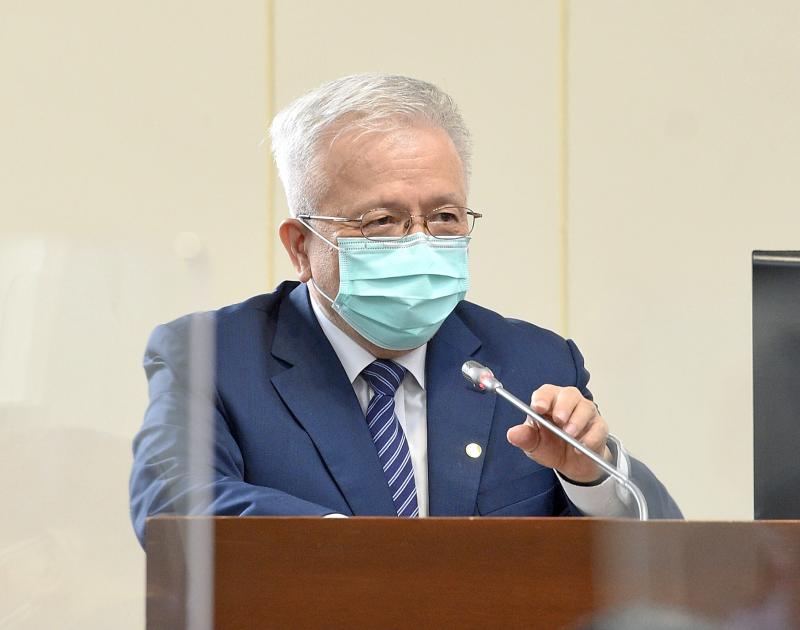A stronger US dollar is taking a toll on the local currency by fueling volatility on local financial markets and adding pressure to imported inflation, a phenomenon the central bank will address at its quarterly board meeting next month, central bank Deputy Governor Yen Tzung-ta (嚴宗大) said yesterday.
As of yesterday, the New Taiwan dollar had tumbled 7.51 percent against the greenback this year, as the US Federal Reserve tightens to curb inflation.
Since the beginning of the year, the TAIEX has shed 12.32 percent as global funds retreated from Taiwan and other emerging markets in the pursuit of better yields elsewhere.

Photo: Lo Pei-der, Taipei Times
The weighted index yesterday closed 1.7 percent lower at 16,020.32 points, Taiwan Stock Exchange data showed.
“The trend not only weighed on the NT dollar, but also hit the currencies of other emerging economies and augmented their debt problems,” Yen told a meeting of the legislature’s Economics Committee.
Yen refused to be pinned down about the central bank’s policy intentions, only saying that the board meeting on June 16 has the final say on the matter.
Consumer prices and the inflation outlook sit atop the central bank’s list of concerns, while the job market and GDP growth would also guide the decisionmaking process, he said.
Taiwan’s consumer prices are forecast to pick up by more than 2 percent this year after rising faster than 3 percent in the past two months, mainly due to spiking international energy and commodity prices, the deputy governor said.
Inflationary pressures could ease in the second half of the year alongside a receding base effect, he added.
The US and Europe have to make drastic policy moves to bring down inflation induced by their money-printing programs to shore up their economies amid the COVID-19 pandemic, Yen said.
Inflationary readings are relatively moderate in Taiwan, giving policymakers room to look at things from a different perspective, he said.
Central bank Governor Yang Chin-long (楊金龍) last week said that Taiwan might have difficulty achieving a GDP growth of 4 percent this year, as worsening inflation, global monetary tightening and the Ukraine war could hurt exports and corporate profit from the second half of the year.
Yen agreed, saying that resurgent virus outbreaks worldwide pose further uncertainty.
Surging daily cases of the Omicron variant of SARS-CoV-2, which hit 90,331 yesterday, have prompted people to stay home, slowing recovery for sectors reliant on domestic demand.
Yen hinted that the central bank might intervene in the local foreign exchange market to help stabilize the NT dollar.

‘FORM OF PROTEST’: The German Institute Taipei said it was ‘shocked’ to see Nazi symbolism used in connection with political aims as it condemned the incident Sung Chien-liang (宋建樑), who led efforts to recall Democratic Progressive Party (DPP) Legislator Lee Kun-cheng (李坤城), was released on bail of NT$80,000 yesterday amid an outcry over a Nazi armband he wore to questioning the night before. Sung arrived at the New Taipei City District Prosecutors’ Office for questioning in a recall petition forgery case on Tuesday night wearing a red armband bearing a swastika, carrying a copy of Adolf Hitler’s Mein Kampf and giving a Nazi salute. Sung left the building at 1:15am without the armband and apparently covering the book with a coat. This is a serious international scandal and Chinese

A US Marine Corps regiment equipped with Naval Strike Missiles (NSM) is set to participate in the upcoming Balikatan 25 exercise in the Luzon Strait, marking the system’s first-ever deployment in the Philippines. US and Philippine officials have separately confirmed that the Navy Marine Expeditionary Ship Interdiction System (NMESIS) — the mobile launch platform for the Naval Strike Missile — would take part in the joint exercise. The missiles are being deployed to “a strategic first island chain chokepoint” in the waters between Taiwan proper and the Philippines, US-based Naval News reported. “The Luzon Strait and Bashi Channel represent a critical access

COUNTERINTELLIGENCE TRAINING: The ministry said 87.5 percent of the apprehended Chinese agents were reported by service members they tried to lure into becoming spies Taiwanese organized crime, illegal money lenders, temples and civic groups are complicit in Beijing’s infiltration of the armed forces, the Ministry of National Defense (MND) said in a report yesterday. Retired service members who had been turned to Beijing’s cause mainly relied on those channels to infiltrate the Taiwanese military, according to the report to be submitted to lawmakers ahead of tomorrow’s hearing on Chinese espionage in the military. Chinese intelligence typically used blackmail, Internet-based communications, bribery or debts to loan sharks to leverage active service personnel to do its bidding, it said. China’s main goals are to collect intelligence, and develop a

PERSONAL DATA: The implicated KMT members allegedly compiled their petitions by copying names from party lists without the consent of the people concerned Judicial authorities searched six locations yesterday and questioned six people, including one elderly Chinese Nationalist Party (KMT) member and five KMT Youth League associates, about alleged signature forgery and fraud relating to their recall efforts against two Democratic Progressive Party (DPP) legislators. After launching a probe into alleged signature forgery and related fraud in the KMT’s recall effort, prosecutors received a number of complaints, including about one petition that had 1,748 signatures of voters whose family members said they had already passed away, and also voters who said they did not approve the use of their name, Taipei Deputy Chief Prosecutor